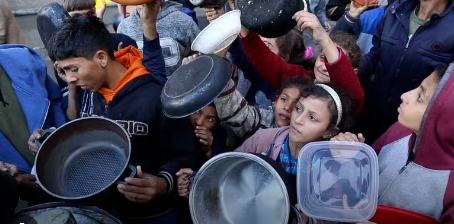New York (Web Desk): The head of the United Nations World Food Programme (WFP) has said that she believes there is a “full-blown famine” in northern Gaza, after seven months of relentless Israel’s bombing amid several Israeli restrictions on food deliveries to the besieged Palestinian enclave.
“Whenever you have conflicts like this, and emotions rage high, and things happen in a war, famine happens,” WFP Executive Director Cindy McCain said during an interview with NBC’s news show “Meet The Press” , which is set to air on Sunday.
“What I can explain to you is — is that there is famine — full-blown famine —” in the north, and it’s moving its way south,” Ms. McCain, an American national, said.
Since mid-March, the United Nations has said famine is “imminent” in Gaza, but has not yet officially stated that it believes famine has struck the territory.
In April, Samantha Power, the director of the US Agency for International Development (USAID) became the first US official to say that it was credible to assess that famine is occurring in portions of Gaza. No other US official has made that assessment.
Ms. McCain said that while there has not yet been an official declaration of famine, based on what her organization has seen and experienced on the ground, she believes there is a “full-blown” issue in Gaza.
“It’s horror. It’s – You know, it’s so hard to look at and it’s so hard to hear, also,” McCain said in her interview.
She went on to say that she is hopeful for a ceasefire in Gaza so that people can begin to be fed “in a much faster fashion.” Ms. McCain added that the people in Gaza need “water, sanitation, medicine – it’s all part of the famine — the famine issue.”
Efforts to provide food aid to Gaza have been met both by Israeli resistance and ceaseless air strikes.
World Central Kitchen, a US-based nonprofit group that has distributed over 43 million meals across Gaza, just resumed operations Monday after seven of its aid workers were killed by an Israeli airstrike on April 1.
Earlier this week, UN Secretary-General Antonio Guterres urged the international community to “do everything possible to avert an entirely preventable human-made famine”.
Lack of security is a major obstacle to distributing aid across Gaza, and he stressed that humanitarian convoys, facilities and personnel as well as people in need “must not be targets”.
“We welcome aid delivery by air and sea, but there is no alternative to the massive use of land routes,” he said, before again calling on Israel to allow and facilitate safe, rapid and unimpeded humanitarian access throughout Gaza, including for the UN’s Palestine relief agency, UNRWA.
Guterres also addressed how Israeli attacks have “decimated” the health system in the enclave, where two thirds of hospitals and health centres are out of commission, while many of those remaining are seriously damaged.
“Some hospitals now resemble cemeteries,” he said, voicing deep alarm over reports of the discovery of mass graves at several locations, including at Al-Shifa and Nasser hospitals.
More than 390 bodies reportedly have been exhumed at Nasser Hospital alone, and “there are competing narratives around several of these mass graves, including serious allegations that some of those buried were “unlawfully killed,” he added.
The UN chief said it is imperative that independent international forensic investigators are allowed immediate access to these sites to determine the precise circumstances under which hundreds of Palestinians lost their lives and were buried or reburied.
“The families of the dead and missing have a right to know what happened, and the world has a right to accountability for any violations of international law that may have taken place,” he said.
The Secretary-General ended his remarks by drawing attention to UNRWA and its “irreplaceable and indispensable work” supporting millions of Palestinians in Gaza, the West Bank, Jordan, Syria and Lebanon.
“UNRWA’s presence across the region is a source of hope and stability. Its education, healthcare and other services provide a sense of normality, safety and stability to desperate communities,” he said.
The agency recently appealed for $1.2 billion to address the humanitarian crisis in Gaza and to respond to needs in the West Bank, where violence is rising.
UNRWA largely depends on donors and some 16 countries halted their contributions earlier this year following Israeli allegations that 12 staff were involved in the 7 October attacks.
The UN appointed an independent body to review the agency’s efforts to ensure the humanitarian principle of neutrality.
The panel, headed by former French foreign minister Catherine Colonna, recently published its report which found that “the set of rules and the mechanisms and procedures in place (at UNRWA) are the most elaborate within the UN system”. Guterres said an action plan is being put in place to implement the report’s recommendations, and he appealed for cooperation from donors, host countries and staff.
Meanwhile, most countries that suspended contributions to UNRWA have resumed them, and the Secretary-General said “we are optimistic that others will join.” Additionally, some UN Member States have given to the agency for the first time, while private donors have also provided support.
However, as a funding gap persists, he urged Member States and donors to pledge generously to ensure the agency’s work continues.
“This is the moment to reaffirm our hope for and contributions to a two-State solution – the only sustainable path to peace and security for Israelis, Palestinians and the wider region,” he concluded.


